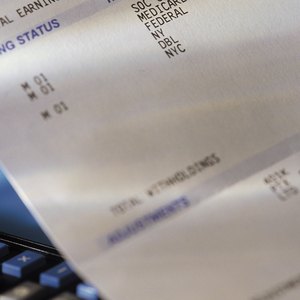
To garnish your salary, a creditor must first file a lawsuit against you, then you must be served with written notice of the lawsuit. If the creditor wins the lawsuit, it can obtain an order to garnish your salary if the state allows wage garnishments. If a government agency aims to garnish, it does not need a court order to do so; however, it must notify you of the garnishment. All of these factors indicate that your salary is being garnished.
Employer Notification
Whether your employer is legally required to notify you of the garnishment depends on state law. If it is a requirement, the garnishment paperwork should reflect this. For example, in California, an employer must give the employee a copy of the garnishment order within 10 days after receiving it. Employees usually know beforehand that their wages are subject to garnishment, but there are exceptions. For example, if an Internal Revenue Service levy notice was sent to your old address, you probably wouldn’t know that your salary is in danger of being garnished. Some employers choose to notify employees as a courtesy – even if state law does not require it – so the deduction doesn’t come as a surprise.
Considerations
If you did not receive notification of the garnishment, the reduction in your salary may take you by surprise. In this case, ask your employer for an explanation. If the reason is due to a wage garnishment, request a copy of the paperwork from your employer. If your employer did not follow state procedures by notifying you of the garnishment, consult an employment attorney.
Pay Stub
If your paycheck suddenly gets smaller, you can tell whether your salary has been garnished by reviewing your pay stub. If your employer is required by state law to list your deductions on your pay stubs, it must state your garnishment deductions.
Calculation
If your pay stub does not break down your deductions – or if you do not receive one at all – how your employer arrived at your deduction amount can get confusing. Use the amount stated on the garnishment paperwork to verify your salary deduction. Note that garnishments are subtracted from disposable income, which is your salary after legally-required deductions, such as payroll taxes. If your calculation differs from your employer’s, alert your employer of the problem. You may contact the issuing agency stated on the paperwork if your employer is improperly withholding the garnishment.
References
- California Courts: WG-002, Earnings Withholding Order
- Associated Financial Group: Garnishments -- What Steps Should Employers Take?
- IRS.gov: Levy
- Department of Labor. "Garnishment." Accessed Feb. 13, 2020.
- Michigan Legal Help. "An Overview of Garnishment." Accessed Feb. 13, 2020.
- Cornell Law School Legal Information Institute. "Consumer Credit Protection Act of 1968 -15 U.S. Code § 1673.Restriction on Garnishment." Accessed Feb. 13, 2020.
- Cornell Law School Legal Information Institute. "Consumer Credit Protection Act of 1968 - 15 U.S. Code § 1672.Definitions." Accessed Feb. 13, 2020.
- Department of Labor. "Fact Sheet 30: The Federal Wage Garnishment Law, Consumer Credit Protection Act's Title III," Page 2. Accessed Feb. 13, 2020.
- United States Department of Labor. "Minimum Wage." Accessed Feb. 13, 2020.
- Department of Labor. "Fact Sheet 30: The Federal Wage Garnishment Law, Consumer Credit Protection Act's Title III," Page 3. Accessed Feb. 13, 2020.
- California Courts. "If You Do Not Pay Your Judgment." Accessed Feb. 13, 2020.
- Office of the U.S. Courts. "Discharge in Bankruptcy – Bankruptcy Basics." Accessed Feb. 13, 2020.
- Cornell Law School Legal Information Institute. "United States Bankruptcy Code - 11 U.S. Code § 523.Exceptions to Discharge." Accessed Feb. 13, 2020.
Resources
Writer Bio
Grace Ferguson has been writing professionally since 2009. With 10 years of experience in employee benefits and payroll administration, Ferguson has written extensively on topics relating to employment and finance. A research writer as well, she has been published in The Sage Encyclopedia and Mission Bell Media.

